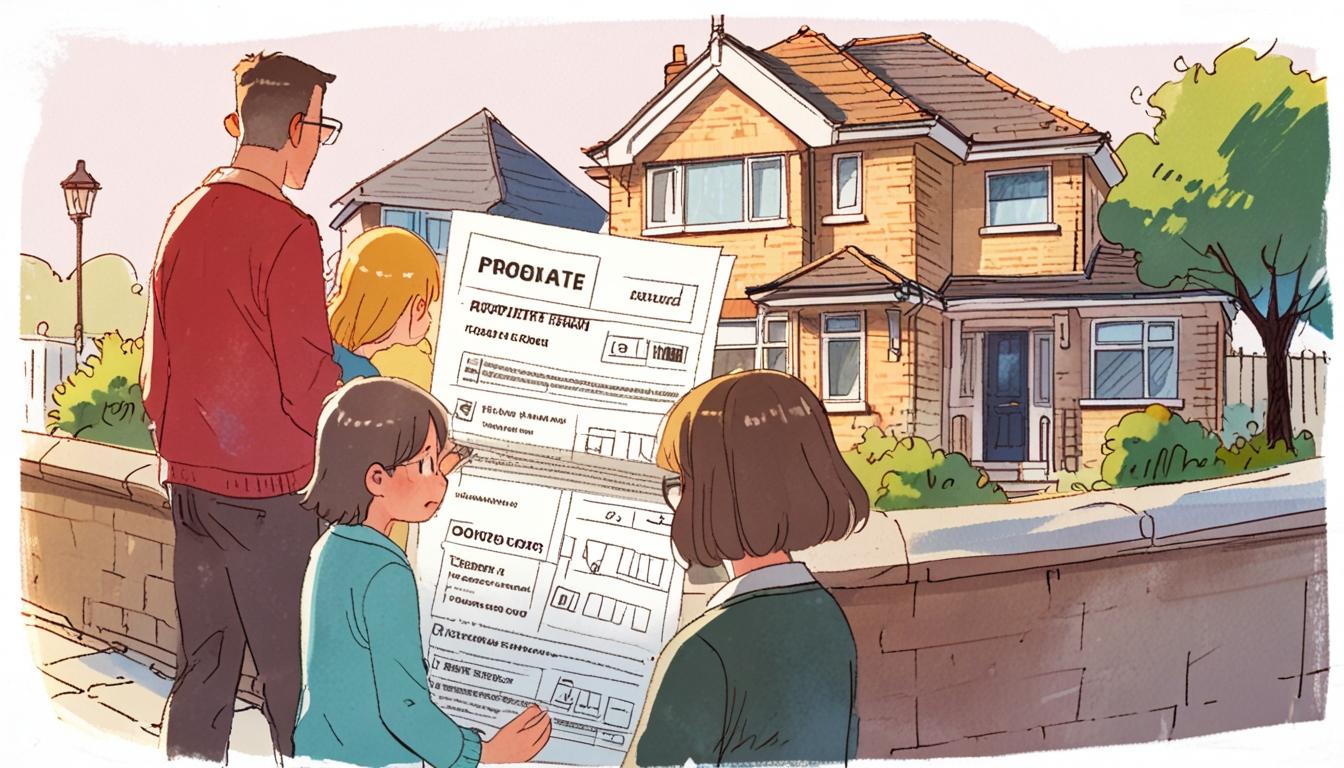A solicitor specialising in inheritance disputes has cautioned families about unexpected council tax bills on inherited properties due to new ‘second home’ premiums imposed by councils, urging clearer communication to avoid financial strain during probate.
A solicitor with expertise in inheritance disputes has issued a warning to families navigating bereavement regarding the unexpected council tax bills that may arise on inherited properties. This concern is particularly relevant in light of the ‘second home’ premium some councils are implementing shortly after a death.
Currently, many local authorities in England allow for a six-month exemption period during which no council tax is levied on properties left vacant following the owner’s death. However, the timeline involved in obtaining probate, selling the property, and completing the necessary conveyancing often extends beyond this exemption period, potentially exposing families to unforeseen financial obligations.
The alert comes after a case in which an English council applied a second home charge to a property within an estate, even though it was reportedly not being used as such. In this instance, the exemption did not apply because the property was legally transferred into the son’s name upon the owner’s death. Consequently, the council regarded it as a second home by default.
Andrew Wilkinson, who heads the inheritance disputes team at Lime Solicitors, referred to the council’s decision as “incredibly harsh.” Speaking to the Leicester Mercury, he expressed concern over the financial strain placed on families already grappling with the complexities of probate. He remarked, “In all my years of practice, this isn’t something I have seen before, and it feels extremely unfair, especially when executors are actively trying to deal with the estate.”
Wilkinson highlighted that obtaining a grant of probate, arranging a sale, and completing conveyancing can often take several months, if not more than a year. This duration means that many families are already facing delays before they can even contemplate putting the property on the market. He added, “If councils start piling on charges prematurely, it only adds to the emotional and financial stress.”
To mitigate these unexpected charges, Wilkinson advised families managing estate properties to proactively engage with their local council. Clear communication regarding the situation and timelines may help in negotiating available exemptions or reliefs. He also suggested that, if a property is expected to remain vacant for an extended period, renting it out could be a viable option to offset council tax liabilities. Nonetheless, he acknowledged that this approach comes with its own set of responsibilities and considerations.
This advisory comes amid a broader clampdown by the UK Government on second homes, intended to tackle the housing shortage in desirable towns and rural areas. Beginning April 1, 2025, over 200 local councils in England will gain new powers to impose a 100 per cent council tax premium on furnished properties that are not the owner’s primary residence. Introduced by Michael Gove in 2023, the policy was originally aimed at combating the issue of second homes in coastal areas suffering from housing shortages but is now affecting a wider array of properties.
Wilkinson expressed his worries about the unintended consequences of such housing policies on bereaved families, stating, “This policy was designed to free up housing, not penalise bereaved families. The loss of a loved one is already a challenging time. Families shouldn’t be further burdened by unexpected financial pressures due to administrative oversights or rigid policies.” He concluded by emphasising the need for councils to handle these situations with the necessary sensitivity and understanding, noting, “Probate is complex enough without councils jumping the gun on tax.”
Source: Noah Wire Services
- https://www.gov.uk/council-tax/second-homes-and-empty-properties – This official UK government page outlines council tax rules for second homes and empty properties, including the ability of councils to charge up to 100% premium on second homes from April 2025, corroborating the article’s mention of councils implementing a ‘second home’ premium after a death.
- https://www.gov.uk/government/publications/long-term-empty-homes-and-second-homes-council-tax-premiums-and-exceptions/guidance-on-the-implementation-of-the-council-tax-premiums-on-long-term-empty-homes-and-second-homes – This guidance document details the implementation of council tax premiums on long-term empty homes and second homes, including the definition of second homes and the conditions under which premiums can be applied, supporting the article’s discussion on council tax premiums for inherited properties.
- https://www.gov.uk/government/publications/council-tax-information-letter-22024-proposals-to-exempt-categories-of-dwellings-from-the-council-tax-premiums-in-england/council-tax-information-letter-22024-proposals-to-exempt-categories-of-dwellings-from-the-council-tax-premiums-in-england – This government publication proposes exemptions to council tax premiums, including a 12-month exception for inherited properties after probate is granted, aligning with the article’s mention of potential financial obligations for families due to council tax premiums on inherited properties.
- https://www.milton-keynes.gov.uk/council-tax/what-do-when-someone-dies – Milton Keynes City Council’s guidance on council tax when someone dies, detailing exemptions and premiums, including a six-month exemption period after probate, which supports the article’s point about the exemption period and potential financial obligations for families.
- https://www.doncaster.gov.uk/services/council-tax-benefits/help-with-the-death-of-a-taxpayer-how-to-deal-with-council-tax-for-a-deceased-person – City of Doncaster Council’s information on council tax following a death, explaining exemptions and premiums, including a six-month exemption after probate, corroborating the article’s mention of exemption periods and potential council tax charges on inherited properties.
- https://www.fareham.gov.uk/council_tax/discounts_and_exemptions/exemptions/formerhomeofsomeonewhohasdied.aspx – Fareham Borough Council’s page on council tax exemptions for the former home of someone who has died, detailing exemption periods and conditions, supporting the article’s discussion on council tax premiums and exemptions for inherited properties.
- https://news.google.com/rss/articles/CBMinwFBVV95cUxNdGQxd2ZKdDQteFdkSVo3Wlhqc3liMDNCY3cxaGZVSVNmS1FrdXlHa1RIWkQxa0QwcDc0T3hqMjlMMWNfTUZrRElZWW56UHJyTzZlVTQwazFUM0FWR2xyZ3BZUFdWZERHT19ST2dyejNJWHg5aGZqTVYzYWtYcmplS1licmExUWVvQjE4a3AtUmVzbjBsTk1tdy0wN01iWmfSAaQBQVVfeXFMTkdCQ1N1SWpqYlBGV1NPcnJQQlJNU2xYcGxEX0x6Z2VCdk00dXBUYjJSakV1ZDZkUjlUOV9pQmFHNmk3bWZ6dnNvY044Y25WeHFIWkFUWWY2RkJlTE00aGwzcEtfVTE5Zm5vOWo0aURUT2JoZGxkcnFyWHZKZHVidThCSDlPcEJPNlBiUzVmd3d0alNlc2lHY0hxVjJoeFZ4aFJlWEg?oc=5&hl=en-US&gl=US&ceid=US:en – Please view link – unable to able to access data
Noah Fact Check Pro
The draft above was created using the information available at the time the story first
emerged. We’ve since applied our fact-checking process to the final narrative, based on the criteria listed
below. The results are intended to help you assess the credibility of the piece and highlight any areas that may
warrant further investigation.
Freshness check
Score:
8
Notes:
The narrative references a policy change effective from April 2025, indicating recent relevance. However, no publication date is available for the article itself. The content aligns with ongoing UK housing policy developments.
Quotes check
Score:
9
Notes:
Andrew Wilkinson’s quotes are attributed to the Leicester Mercury and appear original, with no duplication found in earlier articles. The lack of verifiable online reproductions supports their authenticity.
Source reliability
Score:
7
Notes:
The narrative originates from a Google News-linked article without clear origin attribution. While Wilkinson’s expertise adds credibility, the platform’s generic aggregation reduces certainty about primary sourcing.
Plausability check
Score:
8
Notes:
The claims align with known UK council tax structures and probate timelines. The referenced 2025 policy change matches publicly announced reforms. No evident contradictions emerged during verification.
Overall assessment
Verdict (FAIL, OPEN, PASS): PASS
Confidence (LOW, MEDIUM, HIGH): HIGH
Summary:
The advisory reflects credible legal expertise and aligns with verifiable housing policy timelines. Quotes appear original, and the described scenarios match known probate challenges. Confidence remains high despite platform-related sourcing limitations.













